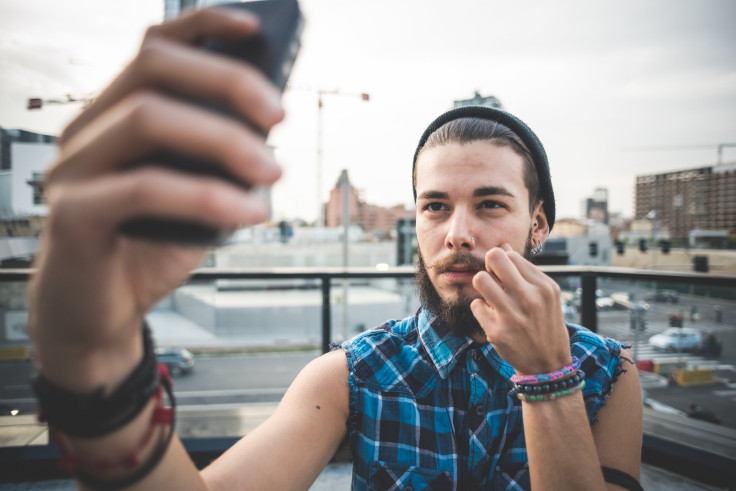Let Me Take A Selfie: Men's Selfie Posts On Social Media May Capture Psychopathic Traits

Selfies are inevitable in the digital age, with smartphones and now "selfie sticks" around. Social media sites like Facebook, Twitter, and especially Instagram cater to today’s selfie-obsessed culture, but could it also be fostering narcissism? According to a recent study published in the journal Personality and Individual Differences, men who post online photos of themselves are more likely to be narcissistic, impulsive, and have an array of anti-social characteristics.
Selfies can lead to self-objectification, as selfie posters begin to value themselves mainly for their appearance rather than for other positive traits. They start to habitually monitor their own appearance by seeing themselves through the lens of an external observer not just in public but also in private settings. The negative effects associated with self-objectification include body shaming, appearance anxiety, depression, and disordered eating, according to Dr. Rachel M Calogero, Dr. Stacey Tantleff-Dunn, and Dr. J. Kevin Thompson, co-authors of Self-Objectification in Women: Causes, Consequences, and Counteractions.
Jesse Fox, lead author of the study and assistant professor of communication at The Ohio State University, agrees self-objectification can lead to a lot of terrible things such as depression and eating disorders in not just women but men. “With the growing use of social networks, everyone is more concerned with their appearance. That means self-objectification may become a bigger problem for men, as well as for women,” said Fox, in an Ohio State University (OSU) news release.
Fox and her colleague Margaret C. Rooney, a doctoral candidate at OSU, sought to explore whether trait predictors of social networking site use and forms of visual self-presentation can serve as measures of predicting narcissism and psychopathy. A total of 800 men aged 18 to 40 completed an online survey asking about their photo posting behavior on social media. The study did not include women because the data came from a magazine that did not have comparable data for women. The participants were also asked to complete a standard questionnaire for anti-social behaviors and self-objectification.
They then were asked whether they edited their photos before posting. This included cropping photos, using filters, and using picture-editing software. “Most people don’t think that men even do that sort of thing, but they definitely do,” Fox said.
The findings revealed self-objectification and narcissism predicted time spent on social media sites. Narcissism and psychopathy predicted the number of selfies posted while narcissism and self-objectification predicted editing photographs of selfies. Those who tend to score higher on psychopathy were more likely to snap the photos and put them online right away as an act of impulsivity.
This does not mean vain men are all psychotic. Instead, it means the men scored higher than average levels for anti-social traits.
“It’s not surprising that men who post a lot of selfies and spend more time editing them are more narcissistic, but this is the first time it has actually been confirmed in a study,” Fox said. “The more interesting finding is that they also score higher on this other anti-social personality trait, psychopathy, and are more prone to self-objectification.”
A similar study published in the journal Scientific Research found out of all the activities people engage in on Facebook, such as updating statuses, watching videos, and browsing other profiles, how they view their own profile was linked to high levels of narcissism. The study included 400 men and women. This doesn’t come as a surprise since narcissistic individuals are extremely self-absorbed and have an exaggerated view of themselves they want the rest of the world to see.
Posting selfies on social media sites could be part of a dangerous cycle of self-objectification and other anti-social traits. For example, if a user posts selfies and gets positive feedback from his friends, he will continue to post more photos of himself. This feeds into his self-objectification and narcissistic traits.
While it is normal to be preoccupied with how we present ourselves online, it’s important to distinguish between when it’s just a selfie for fun and when it become a dangerous psychological downward spiral.
Sources: Fox J and Rooney MC. The Dark Triad and trait self-objectification as predictors of men’s use and self-presentation behaviors on social networking sites. Personality and Individual Differences. 2015.
Alloway T, Kemp G, Qureshi M and Runac R. Is Facebook Linked to Selfishness? Investigating the Relationships among Social Media Use, Empathy, and Narcissism. Scientific Research. 2014.
Published by Medicaldaily.com



























